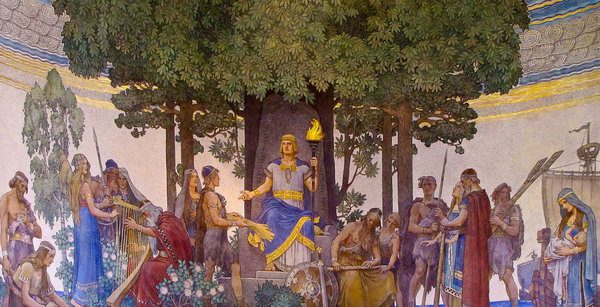On Wednesday June 17 various writers from Patheos Pagan got together to discuss the roles deities play (or don’t play) in our lives. In the course of that conversation we touched on multiple topics. One of my favorite snippets of our chat was a discussion about personal gnosis.
“Unverifiable personal gnosis (UPG) is a neopagan concept. The general idea of UPG is that some insights into divinity and the universe come unbidden to a particular individual, and cannot be tested or verified by anyone else. This is most often the case with neopagans who feel “called” to a particular god or pantheon.-RationalWiki
For the record, parts of our initial conversation have been edited and rearranged for clarity. Our discussion was not argumentative, if it comes across that way it’s because I’ve failed as an editor. It’s not necessary to read part one of our chat, Atheism, Polytheism, and Pagans: A Discussion, but it does provide some context and a bit of intro to some of the persons involved.

Jason Mankey (Raise the Horns): Why do our differences always feel so much greater online? When I go to a festival I always feel like it’s easy to find consensus around the campfire.
Ian Corrigan (Into the Mound): The people who don’t dig the fire-circle consensus stay at camp.
Rua Lupa (Paths Through the Forest): I agree with Ian, the same happens for Court at SCA events, and the bardic circles too.
Dana Corby (The Rantin Raven): Because everything is harder to communicate in writing. All the nuances are gone, not to mention the energy flow from person to person that actually carries nearly half our meaning.
Jason Mankey: How do you see the gods Ian? All separate? All inter-related some how?

Molly Khan (Heathen at Heart): I think there’s something to the online/offline dichotomy. In person I am cool enough with less scholarly or rigorous theology to hang out with, and honestly learn from, all sorts of Pagans. Online not so much.
Ian Corrigan: I don’t think that adherence to a formal theology has much value in a Pagan spirituality.
Shauna Aura Knight (Seeking the Grail): I think the Yoga reference is actually pretty useful here, because it’s a great example of a spiritual practice/ philosophy as well as a physical practice. Most people think of Yoga as just a physical practice. I see a lot of physical things being incredibly effective for ritual work, and for me, the physical practice/logistics, and the theology, don’t need to be in alignment.
The ritual work I do is about getting people into trance. I don’t care what their theology is. I’m there to use breathwork, movement, chanting, drumming, dancing, fire, decorations…I’m there to get their brains into an altered state. It’s just science.
Whatever people do with that altered state, whether it’s connecting to the Pantheistic All or their pantheon or a specific deity, or to their holy guardian angel or just their deepest self…that’s irrelevant. The practice, the physicality, the breath and the song, the altered state–it works.
Ian Corrigan: Yes, the practical value of religious activity is the generation of personal spiritual experience. Everything else is side-effect.
Molly Khan: More than meaning, I think relationship has a lot to do with it as well. When a particularly badly researched statement is made about a deity I honor in person, the respect and relationship I have with that person mitigates my reaction, both in my mind and out loud. Online that doesn’t happen nearly as often.
Ian Corrigan: I will always advocate for basing spiritual symbols on verifiable tradition. If one is simply in error about the flavor of a deity, it is as if one makes pie with cherries and calls it apple pie.
John Halstead (The Allergic Pagan): Molly, maybe it’s like two people that both know someone named Steve, but there’s more than one Steve out there. Ian, I put sour cream in my apple pie, and my wife doesn’t recognize it as apple pie-Who is the final authority on apple pies?
Ian Corrigan: Cultural consensus John.
John Halstead: Who speaks for the culture?
Ian: It speaks through local mouths . . . kinda like gods.
John: If that’s the case then, Freya may be a moon goddess, because probably most people are not scholars.

Ian: John – I see us in a transitional phase in our revival. There is merit, still, in calling for a rigorous learning about what ancient Paganism was like. In time we’ll end up, I think, with new expressions of the gods shaped by our own culture, in the meantime I prefer a conservative ethos in the matter.
John: Ian, no superhero worship then?
Ian: Nor Tolkienian, nor Lovecraftian gods.
Molly: Ah, but was Tolkien picking up on Anglo-Saxon ideas of deities? I have some thoughts on him and ancient Paganism.
Ian: A fiction with resonance to the ancestors is at least better than one with none, perhaps. But fiction isn’t myth, nor vice-versa.
Jason: I know a lot of people have trouble with “personal gnosis” and especially online it usually comes with a hearty “that’s not in the myth” but for me that’s an important part of the experience. We know very little about Cernunnos but when John Beckett and I seem to describe the same god (through personal gnosis) that has to count for something right? Shouldn’t we be building a new understanding of the gods, using both the new and the old?
John: But Jason, you and John are part of the same subculture.
Ian: Jason – we *are* building it, I think – but the method is still lifting rocks from old buildings.
Jason: I think John and I come from very different worlds . . . Druid and Witch.
Shauna: I look at personal gnosis as this–back in the day, someone had personal gnosis about Isis, or Aphrodite, or Inanna, or Freya. How is our modern personal gnosis any less valid than that?

Jason: John and I have both gone to PantheaCon, but other than that . . . . . the way we ritualize is very different, the experiences of a BTW Witch are going to be very different from an OBOD Druid. But I love most Druids, they are definitely a part of my more extended tribe. I probably spend more time in the ADF Suites at festivals than the general Pagan or Witchy ones.
Ian: Personal gnosis is as valuable as its cultural cachet. One modern guy like to say he wants his innovations to ‘rhyme with’ tradition. I like that.
Molly: I agree, I think UPG is valid and incredibly important to each individual. These ideas can come together as cultural consensus, and I think in a lot of cases- Loki is a big one in heathenry – this has happened.
John: Someone else’s experience of Hephaestus didn’t resonate at all with hers — it seems like a case of confirmation bias.
Ian: UPG shapes one’s personal cult, but often ought to be set aside to attend village rites.
John: To me, we ignore the outliers.
Ian: Outliers with good ideas can get heard.
Molly: I think even outliers can be useful as Ian says, in that person’s personal rites. Like knowing someone in a very different way than the general public does.
John: I’m not trying to invalidate your experience, I just think this consensus thing is suspect.
Niki Whiting (A Witch’s Ashram): What we need is dinner, in person, with lots of mead and wine.

















